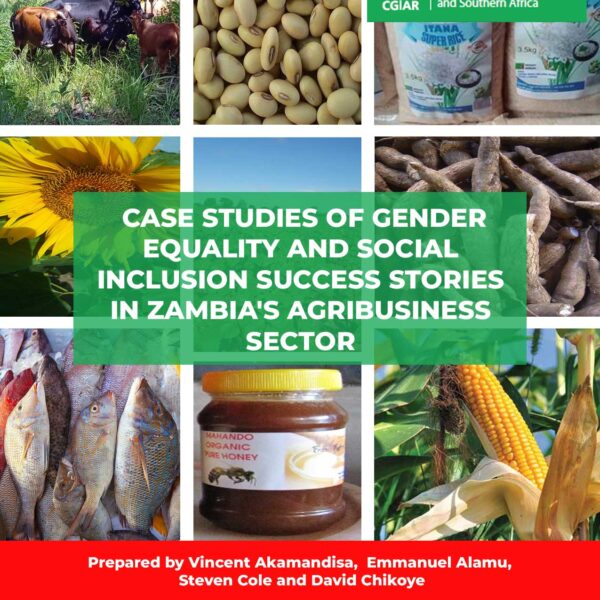CASE STUDIES OF GENDER
EQUALITY AND SOCIAL
INCLUSION SUCCESS STORIES
IN ZAMBIA'S AGRIBUSINESS
SECTOR
Summary
A situation analysis of gender issues in Zambia reveals that some challenges remain critical and fundamental to the country’s achievement of its vision and goal of gender equality, social inclusion and delivering on the Sustainable Development Goals (SDGs). This is despite the fact that Zambia has signed and ratified various international and regional commitments to gender equality and development. Zambia has also enacted various pieces of legislation to ensure the effective mainstreaming of gender in all sector policies, laws, plans, programs, projects, and outputs. The operationalization of these instruments still lags behind and the expected gender equality outputs and impacts are still low at all levels, as evidenced in all sectors of national development in Zambia.
Nonetheless, this report presents case studies of success stories of value chain actors who operate in Zambia’s agribusiness sector to promote gender equality and social inclusion. Potential success stories were identified during a stakeholder workshop on gender equality and social inclusion in the agribusiness ecosystem for multidimensional mapping of opportunities and challenges held in September 2022 in Lusaka. Some of these stories were then selected from different value chains for follow-up by the research team. Interviews with the value chain actors in these stories were arranged and conducted in early 2023. The case study method was used to identify value chain actors who are using good practices to address and promote gender inequality and social inclusion in the agribusiness sector in Zambia. We present the case studies as one means of sharing some of the strategies used by these value chain actors and their achievements so to contribute to scaling out of their successes to others in Zambia and in the Eastern and Southern Africa (ESA) region for greater gender equality and social inclusion in the agricultural sector.
Introduction
Zambian agriculture plays a key role of supporting industries in the production of raw materials, producing domestic and exportable agricultural goods and generating employment for the nation. Agriculture is the main livelihood of over 70% of the Zambian rural population. Agricultural production is still dominated by government-supported, rain-fed cultivation of maize but other crops like cassava, soybean, wheat, sunflower, cotton, and tobacco are also of great economic importance. The fisheries and livestock sectors have also been increasing production in recent decades. The changing weather patterns and low investments in research and development, policy inconsistences, slow program implementations coupled with inadequate extension and advisory services are some of the major challenges of agribusiness development in Zambia.
The levels of achievement of goals or success in any agribusiness enterprise vary for different individuals and institutions, even those operating in the same business environment. Players may face the same challenges, but their abilities, capabilities, or connections to support systems ultimately affect their efficiency and productivity. The agribusiness case studies of Zambia’s success stories present lessons on why some businesses prosper and can influence other players to adopt and adapt technologies that improve their respective agribusinesses and contribute to the attainment of gender equality and social inclusion.
The case studies follow the workshop on gender equality and social inclusion in the agribusiness ecosystem for multidimensional mapping of opportunities and challenges held on 29th September 2022 at the Asmara Hotel in Lusaka. The workshop was held to conceptualize gender equality and social inclusion in Zambia’s agribusiness ecosystem; identify and collect data on successful agribusinesses in Zambia; address gender-based constraints to the active participation in and benefits from agribusiness by women, youth, and persons with disabilities; and establish a pan ESA gender equality and social inclusion agribusiness network. The workshop identified organizations that support and individuals engaged in agribusiness in Zambia. Some were purposively selected and interviewed for the compilation of success stories in this report and will form part of the agribusiness digital network database. For more details of the proceedings of the workshop refer to the report submitted to the Work Package 5 of the One CGIAR Initiative Ukama Ustawi.
The development of the case studies was funded by One CGIAR Initiative Ukama Ustawi. They collate experiences, challenges, opportunities, and successes from seven diverse agribusinesses (small, medium and large scale) in roots and tubers (cassava), legumes (soybean), cereals (rice) livestock (goats), aquaculture (fish), agro-dealer, and apiculture (honey). The cases were studied at different nodes in value chains to examine and narrate the constraints and opportunities to contribute to successful gender equal and socially inclusive agribusinesses.
This report presents information gathered through Key Informant Interviews (KIIs) of those identified to learn more about their activities and strategies for sharing with other network members. The stories were collected from 7 districts in 5 Provinces of Zambia.


